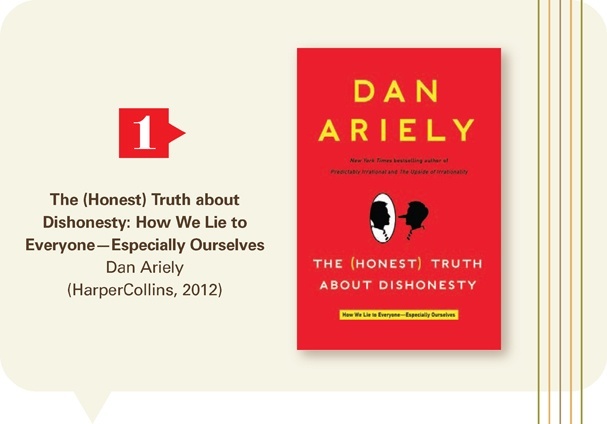
This review first appeared in the CHRISTIAN RESEARCH JOURNAL, volume 36, number 01 (2013). The full text of this article in PDF format can be obtained by clicking here. For further information or to subscribe to the CHRISTIAN RESEARCH JOURNAL go to: http://www.equip.org/christian-research-journal/
You are a thief and a liar! You may not be a grand thief—you won’t take the office computer home, but the office pen won’t hurt, will it? You lie to yourself (that dress doesn’t make you look fat), you lie to others (just this one brownie won’t hurt you), and you cheat, although minimally (just five minutes in the no-parking zone). These things add up and change our character over time.
Dan Ariely, a professor of psychology and behavioral economics at Duke University, director of the Center for Advanced Hindsight and New York Times bestselling author of Predictably Irrational and The Upside of Irrationality, has written another provocative book, The (Honest) Truth about Dishonesty. This book is about the experiments Ariely conducted with approximately thirty thousand people, where he found that very few people cheat a lot, but almost all of us cheat a little bit. Ariely’s book is written with a great deal of humor and stories where he argues that we “lie to everyone—especially ourselves.”
Dishonesty Is Not Based on Rational Inference. It is a common assumption that, whether consciously or not, we use a “cost–benefit analysis” method to decide if we will cheat: “What do I stand to gain, and how much do I stand to lose?” According to Ariely, however, how we decide whether to be dishonest is a lot more complicated than that. The standard model takes into account only the punishment (typically of a legal nature) and does not include variables such as psychological, environmental, or societal factors that may exist to help keep us honest. Ariely argues each of these factors affects our decision about whether to act dishonestly or not. His scientific research establishes that the myth that we are all basically good is false. His conclusion is that we all cheat (and, I add, including Christians), but the question is: how much, when, and why?
We Are All Dishonest in One Way or Another. You probably consider yourself to be a law-abiding, good citizen. But what if you were faced with a cataclysmic event that devastated your community and destroyed your social structure—where there were no police, no hospitals, and no grocery stores? What would you do, or not do, to survive—to protect and provide for your family? The thought about what I am capable of under the right circumstances frightens me, but also confirms what God says in Scripture:
God looks down from heaven
on the children of man
to see if there are any who understand,
who seek after God.
They have all fallen away;
together they have become corrupt;
there is none who does good,
not even one. (Ps. 53:2–3 ESV)
And in the words of Jesus, “No one is good—except God alone” (Mark 10:18 ESV). Yes, what Ariely and other social scientists have confirmed with their scientific research is an ancient truth: we are sinners.
This ancient truth applies to all people—sadly, even to the redeemed. We are reminded of this in The Scandal of the Evangelical Conscience: Why Are Christians Living Just Like the Rest of the World? in which Ronald J. Sider argues just what his title suggests—that Christians are not immune to the corruption of what the apostle Paul calls “the flesh.” The fact that there is a universal understanding that we are all in need of forgiveness underscores the existence of man’s fallen nature. In Islam there are the five daily prayers where faithful Muslims beseech the almighty for forgiveness. In Judaism there is the Day of Atonement. In Christianity there is the ultimate offer of true forgiveness at the foot of a Roman cross.
What Keeps Us Honest (or Dishonest)? Ariely argues that before we cheat, the following fascinating subliminal considerations come into play:
Are people in my social group doing it (speeding, leaving work early, boarding planes before their group numbers are called)? “When the cheater is a part of our social group, we identify with that person and, as a consequence, feel that cheating is more socially acceptable. But when the person cheating is an outsider, it is harder to justify our misbehavior, and we become more ethical out of a desire to distance ourselves from that immoral person” (loc. 2688, emphasis added). We can conclude from Ariely’s findings that just as calluses form on one’s feet, they form on one’s soul. Morality tends to erode when we are witnessing unethical behavior over time.
Is someone observing my behavior? (Did the cop see me as I sped by?)
Is it only an insignificant amount? (Ten cents rather than $10, or one paperclip rather than a box of them?)
Are we tired or stressed? Psychologists call it “Ego Depletion.” People fall into temptation more frequently when the part of their brain that is in charge of deliberative thinking is otherwise occupied. Ariely concludes that our capacity for resisting diminishes as time goes on and it increases the likelihood of cheating.
Did I feel good about myself that day? Interestingly, feeling bad or guilty makes people act more moral!
Am I reminded of a moral code? Are there daily reminders? Is there accountability? It helps.
Is it money I am taking or something similar? How removed am I from the dishonest action? (Ariely’s research established that it is easier for people to take home a $5 pen from the office than it is to take home $5).
Ariely argues that these subliminal factors play a major role in shaping our behaviors and determine whether we act dishonestly or not.
There are rational forces that we normally think drive our dishonest behavior, but don’t. There also are irrational forces that we don’t think drive our dishonest behavior, but do. In other words, lying, cheating, and Ariely’s already famous predictable irrationality are all closely connected.
He writes, “All of us continuously try to identify the line where we can benefit from dishonesty without damaging our own self-image.…We tell ourselves story after story until we come up with an explanation that we like and that sounds reasonable enough to believe.…People can manipulate answers (play mental gymnastics) in order to get the response they think best reflects their bias, even if it is not the truth” (165–67).
One of the many humorous examples Ariely provides to prove this point is that of the startling phenomenon that a large number of grandmothers die during college finals week. He cites a study conducted by biology professor Mike Adams: “Grandmothers are ten times more likely to die before a midterm and nineteen more likely to die before a final exam.” It seems that finals are dangerous to these sweet old ladies’ health! I imagine a college student justifies falsely alleging the demise of his or her grandmother by thinking, “Grandma is really OK; Grandma doesn’t know I am lying, the professor doesn’t know I am lying, other college students lie, I get an extra week to cram—what is the harm?” Again, we lie, and lie to ourselves to justify it.
Does This Research Show That We Don’t Need God to Be Moral? No, not at all. All that Ariely argues is that we all cheat in one way or another morally, when the circumstance and the time are right.
Why Should Apologists Read This Book? It helps us understand the subliminal factors that play into our decision-making processes. It also gives even more scientific data for the doctrine of original sin, helping us make the case that we are all in need of redemption—-especially those who don’t think they need it.
Problematic Issues with This Book. First, Ariely has lumped all transgressions, indiscretions, and cheating into “cheating.” Lying, cheating, stealing, and so on, are different things we do and for different reasons. Second, Ariely writes with jest about the diabolical nature that resides in us all. The seriousness of these issues demands one treat it as such—or at least admit its gravity. Third, the vast majority of his thirty thousand subjects are students, many of whom are about eighteen to twenty-five years old, which hardly gives us a sample of the population. Last, he completely avoids or disregards the source or origin of our cheating.
The Root of the Problem. Once we more clearly understand the forces that drive us to do anything dishonest, Ariely says, we can combat them by restructuring our environment, therefore achieving better behaviors and outcomes. This typical politically liberal answer to evil—“Change the environment and you can change the person”—fails. History is filled with disastrous utopias that have embraced this fairytale. (See How Now Shall We Live? by Charles Colson and Nancy Pearcey [Tyndale, 2004] for a brilliant analysis of this myth historically.) Also, increasing punishment in order to change behavior is too simplistic of an answer, as it addresses only one factor that helps determine whether we are dishonest or not, and, as Ariely illustrated, there are many more factors. What we need is a robust understanding of what sin is, personal responsibility, redemption, justification, and sanctification to address the core issue—the fallen human heart that is in desperate need of restoration with its maker. The fundamental issue is sin, and cheating is a symptom of that.
But many have argued that the concept of sin is a social construction. Orval Hobart Mowrer, former professor at Johns Hopkins University, and former president of the American Psychological Association, took issue with this. He addressed it in his article, “Sin, the Lesser of Two Evils,” in 1960:
For several decades we psychologists looked upon the whole matter of sin and moral accountability as a great incubus and acclaimed our liberation from it as epoch-making. But at length we have discovered that to be “free” in this sense, i.e., to have the excuse of being “sick” rather than sinful, is to court the danger of also becoming lost. This danger is, I believe, betokened by the widespread interest in Existentialism which we are presently witnessing. In becoming amoral, ethically neutral, and “free,” we have cut the very roots of our being; lost our deepest sense of selfhood and identity; and, with neurotics themselves, find ourselves asking: Who am I? What is my destiny? What does living (existence) mean? (“Sin, the Lesser of Two Evils,” American Psychologist, 15 [1960]: 301–4)
In 1651 Thomas Hobbes wrote in his Leviathan that the condition of man is a condition of war of everyone against everyone. Hobbes as well as Mowrer was convinced that man is a fallen creature in need of redemption—this is a truth echoed in the halls of Christian history. In his own way, Ariely has reminded us of that diagnosis. Now we can move from there to the radical remedy: the amazing grace available in the gospel.
—Khaldoun Aziz Sweis
Khaldoun Aziz Sweis is tutor of philosophy at Oxford University and assistant professor of philosophy and chair of the World Languages and Cultures Department at Olive-Harvey College. He is the editor of Christian Apologetics: An Anthology, co-edited with Chad Meister (Zondervan, 2012) and Debating Christian Theism, co-edited with Chad Meister and J.P. Moreland (Oxford University Press: forthcoming, 2012).








